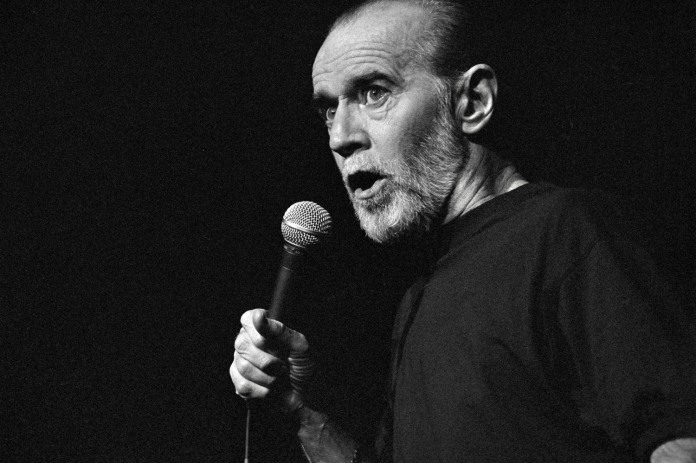George Carlin, a seminal figure in American comedy, wielded his razor-sharp wit to critique societal norms, politics, and the human condition. Renowned for his incisive observational comedy and dark humour, Carlin’s influence transcended the realm of entertainment, leaving an indelible mark on cultural and political discourse.
Early Life and Career
Born on May 12, 1937, in the Bronx, New York, George Denis Patrick Carlin was raised in a working-class Irish-American family. His early life was marked by a tumultuous relationship with formal education and authority, elements that would later permeate his comedy. Carlin’s career began in the late 1950s as a conventional comedian, performing on television and in nightclubs. His early material, influenced by the likes of Danny Kaye and Spike Jones, was relatively mainstream, catering to the expectations of a broad audience.
However, the 1960s and 1970s heralded a transformative period in Carlin’s career. Embracing the countercultural movements of the time, he radically altered his comedic style, adopting a more confrontational and politically charged approach. This shift was epitomised by his landmark album, “Class Clown” (1972), which featured the infamous “Seven Words You Can Never Say on Television” routine. This bit not only solidified Carlin’s reputation as a provocateur but also led to a pivotal Supreme Court case on broadcast censorship.
Political Philosophy and Critique
Carlin’s comedy was deeply rooted in a sceptical and often cynical view of political institutions and societal norms. He was an ardent critic of government, religion, and corporate power, frequently lambasting these entities for their perceived hypocrisy and corruption. Carlin’s political philosophy can be characterised as libertarian, albeit with a uniquely misanthropic twist. He eschewed the optimistic belief in human potential that typifies much libertarian thought, instead focusing on the absurdities and failings of human behaviour.
A recurring theme in Carlin’s work was the critique of American politics and culture. He derided the electoral process as a charade, famously quipping, “If you vote, you have no right to complain.” This sentiment was reflective of his broader disillusionment with the political system, which he viewed as inherently corrupt and ineffectual. Carlin’s critiques extended to both major political parties in the United States, rejecting the notion that substantive differences existed between them.
Social Commentary and Influence
Beyond politics, Carlin’s comedy often addressed broader societal issues, including consumerism, environmental degradation, and the absurdities of everyday life. His 1992 special, “Jammin’ in New York,” is particularly notable for its prescient commentary on environmental issues and the Gulf War. Carlin’s ability to blend humour with incisive social critique made him a distinctive voice in American comedy.
Carlin’s influence is evident in the work of numerous contemporary comedians who cite him as a key inspiration. His willingness to tackle taboo subjects and challenge societal norms paved the way for a more daring and introspective brand of comedy. Additionally, Carlin’s impact extends beyond the realm of comedy; his critiques of American culture and politics resonate with many who share his scepticism of authority and power.
Legacy
George Carlin passed away on June 22, 2008, yet his legacy endures. He left behind a body of work that continues to provoke thought and inspire debate. Carlin’s comedy remains relevant, with his observations on politics, society, and human nature as pertinent today as they were during his lifetime. His fearless approach to comedy and his unwavering commitment to speaking truth to power have cemented his status as a cultural icon.
George Carlin’s life and politics are a testament to the power of comedy as a tool for social critique. His evolution from a conventional comedian to a subversive cultural commentator reflects the changing landscape of American society and the enduring need for voices that challenge the status quo. Carlin’s work remains a powerful reminder of the importance of questioning authority and embracing scepticism in the pursuit of truth.
Challenge George by all means but do it from the brain. The rest is just noise.
KEEP US ALIVE and join us in helping to bring reality and decency back by SUBSCRIBING to our Youtube channel: https://www.youtube.com/channel/UCQ1Ll1ylCg8U19AhNl-NoTg AND SUPPORTING US where you can: Award Winning Independent Citizen Media Needs Your Help. PLEASE SUPPORT US FOR JUST £2 A MONTH https://dorseteye.com/donate/







